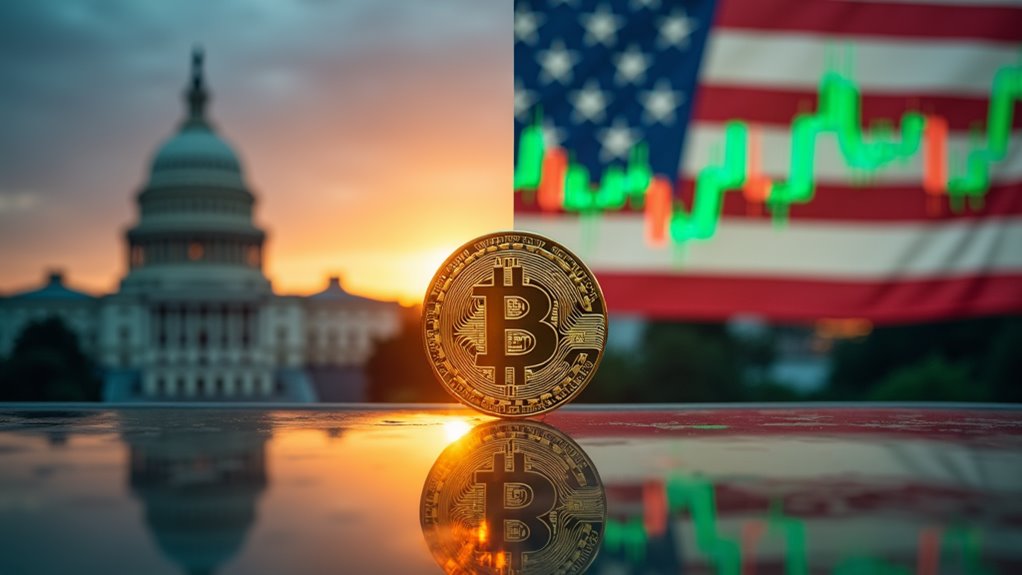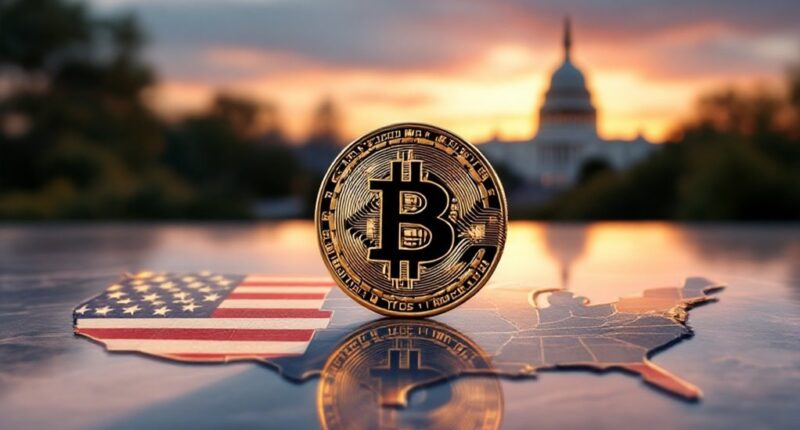Trump’s Bitcoin initiatives show promise but face substantial hurdles before America can claim global crypto dominance. The Strategic Bitcoin Reserve and industry-friendly regulatory shifts have created momentum, while the appointment of crypto-savvy officials signals serious commitment. However, market volatility, potential conflicts of interest, and international competition remain significant challenges. The long-term success depends on policy consistency and addressing critics’ concerns about financial stability. The crypto revolution’s next chapter awaits further developments.

While cryptocurrencies have faced regulatory uncertainty for years, former President Donald Trump has disclosed an ambitious plan to transform the United States into what he calls a “Bitcoin superpower.” Through a series of executive actions and policy initiatives launched since retaking office in January 2025, Trump has dramatically reversed his once-skeptical stance on digital assets.
At the heart of Trump’s crypto strategy is the newly established Strategic Bitcoin Reserve, created by executive order on March 6, 2025. This novel government fund is stocked with Bitcoin seized by law enforcement and cannot be sold once deposited. It’s fundamentally a national piggy bank for digital gold – only the government keeps adding coins but never breaks it open.
Trump’s administration has simultaneously hit pause on the SEC’s aggressive enforcement actions against crypto companies, appointing industry-friendly leaders to key regulatory positions. The president even hosted the first-ever White House Digital Asset Summit and appointed a “Crypto and AI Czar” to coordinate policy efforts. His administration is also exploring how DeFi systems could replace traditional banking infrastructure, potentially revolutionizing how Americans access financial services.
“We’re ending the regulatory war on crypto,” Trump declared while urging Congress to pass extensive legislation. The bipartisan GENIUS Act for stablecoin regulation is already advancing through the Senate, potentially offering clarity in a space that has long resembled the Wild West of finance.
Trump’s enthusiasm for dollar-backed stablecoins reveals a strategic dimension to his crypto embrace. Critics note that previous premature sales of government-held bitcoin have cost taxpayers an estimated over $17 billion in lost potential value. The strategic pivot appears motivated by growing evidence that global Bitcoin adoption could potentially diminish the dollar’s status as the world’s primary reserve currency. His administration views these tokens as extending American financial influence globally – like the dollar, but with a digital upgrade.
Not everyone is cheering these moves. Critics point to Bitcoin’s recent 23% price drop from January’s all-time high and raise concerns about potential conflicts between Trump’s personal crypto ventures and his official policies. Others worry about foreign influence through crypto donations.
The ultimate question remains whether this dramatic policy shift represents a visionary approach to positioning America at the forefront of financial innovation, or if it’s merely catching a falling knife in a volatile market.
Either way, the crypto landscape in America looks dramatically different than it did just months ago.
Frequently Asked Questions
How Will Trump’s Bitcoin Policies Affect Global Cryptocurrency Regulations?
Trump’s pro-crypto policies could greatly reshape global cryptocurrency regulations.
By establishing clear domestic frameworks and potentially positioning America as a crypto-friendly jurisdiction, other nations may feel pressure to adopt similar approaches or risk capital flight.
The U.S. stance could influence international regulatory bodies and create a domino effect where countries either align with America’s more permissive approach or maintain stricter regulations, potentially creating regulatory arbitrage opportunities in global crypto markets.
What Specific Tax Changes Might Trump Implement for Bitcoin Investors?
Trump’s potential Bitcoin tax policies could include eliminating capital gains tax on domestic crypto projects while maintaining taxes on foreign-held assets.
The income tax exemption for earnings under $150,000 might increase disposable income for potential crypto investors.
The Strategic Bitcoin Reserve could influence Bitcoin’s tax classification as a strategic asset, potentially creating preferential treatment similar to gold.
These changes would likely aim to incentivize U.S.-based Bitcoin investment while generating revenue from international crypto holdings.
Which Cryptocurrency Experts Are Advising Trump on His Bitcoin Strategy?
Trump’s cryptocurrency advisory team features several key experts.
David Sacks serves as White House AI and Crypto Czar, described by Trump as “brilliant.”
Bo Hines leads the Presidential Council of Advisers for Digital Assets as Crypto Council Chief.
Eric Trump, appointed to Metaplanet’s Strategic Board, acts as a Web3 ambassador.
Senator Cynthia Lummis provides legislative expertise through her BITCOIN Act.
Simon Gerovich, Metaplanet CEO, contributes his experience managing substantial Bitcoin holdings.
How Might Trump’s Bitcoin Vision Impact U.S.-China Technology Competition?
Trump’s Bitcoin vision could reshape U.S.-China technology competition by establishing American dominance in digital assets while China pursues its own digital currency path.
This move may accelerate the technological cold war, with Bitcoin potentially becoming another front alongside AI and semiconductors.
As China aims to reduce dollar dependence, Trump’s Strategic Bitcoin Reserve could strengthen America’s financial positioning.
The resulting technological rivalry could further fragment global digital finance into competing spheres of influence.
Will Trump Create a Government-Owned Bitcoin Reserve if Elected?
Trump has already created a government-owned bitcoin reserve through an executive order signed in March 2025.
The Strategic Bitcoin Reserve holds approximately $17 billion worth of bitcoin from government forfeitures and prohibits selling these assets.
The initiative includes a separate Digital Asset Stockpile for non-bitcoin cryptocurrencies.
While Trump aims to make the U.S. an “undisputed Bitcoin superpower,” critics question both the economic rationale and potential conflicts of interest with his crypto ventures.









